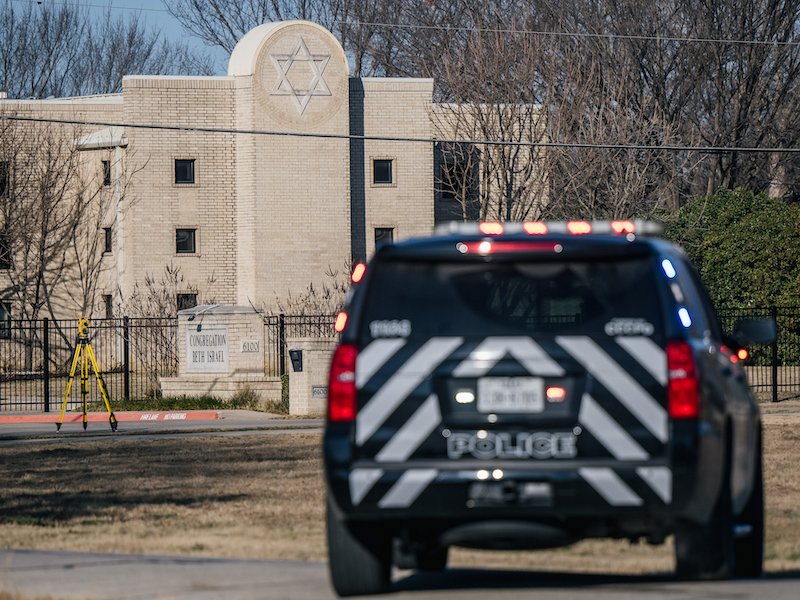Your Daily Phil: Security and diversity at High Holiday services + a new Sephardic fellowship
Good Tuesday morning!
In today’s Your Daily Phil, we cover how Jewish movements are addressing the potential tension between synagogue security and welcoming diverse congregants during the High Holidays, and share some results from a recent survey on philanthropy. Below, we report on a new fellowship for Sephardic leaders.
The Sephardic Leadership Institute (SLI) has launched the first national cohort of its Sephardic Leaders Fellowship, a six-month program to help support and build a network of Sephardic and Mizrahi Jewish professionals.
The fellowship will “provide lectures, talks and discussions about issues pertaining to Sephardic, Mizrahi Jews, the Jews in general – but specifically through a Sephardic lens,” Ty Alhadeff, SLI’s director, told eJewishPhilanthropy.
Topics for the fellowship include “Where do Sephardic Jewish Americans fit in Diversity, Equity, and Inclusion (DEI)?” and “Sephardic Jews as an Intersectional Bridge,” as well as antisemitism.
The institute was launched in July with funding from the Jewish Community Response and Impact Fund (JCRIF), a coalition of Jewish funders that came together at the beginning of the pandemic. It is a project of a Bay Area nonprofit called Jews Indigenous to the Middle East and North Africa (JIMENA), which aims to provide education about, and advocate for, Sephardic and Mizrahi Jews. SLI’s focus on DEI comes after JIMENA successfully lobbied for Jews to be included in California’s Ethnic Studies model curriculum, which the state adopted last year.
The fellowship program was piloted last year as a local initiative between JIMENA and the San Francisco Jewish Community Federation to connect Bay Area professionals and increase Middle Eastern and North African representation in Jewish organizations.
Now, Alhadeff hopes that the national scale of the program – with 20 participants across 10 states (and Toronto) – will create stronger educational opportunities for Jewish professionals. For example, Alhadeff points to what participants might learn from his native Seattle, where a Sephardic community has thrived for more than 100 years, about how to represent Middle Eastern and North African Jews in smaller communities.
“It’s been interesting to reach out to people across the country [who] don’t really have the institutional framework, and to see how communities like Seattle might be able to offer guidance,” Alhadeff said.
Read more here.
STAYING SAFE
Jewish movements confront tensions between security and welcoming ahead of High Holidays


Brandon Bell/Getty Images
How can synagogues both welcome congregants of all backgrounds and keep them secure? Congregations have been asking that question for years, but it’s become especially relevant in the run-up to this year’s High Holiday season, as communities have both experienced a rise in antisemitism and have placed an increased focus on diversity and inclusion, reports eJewishPhilanthropy’s Ben Sales.
Making it work: Experts asserted last week that it is possible, if not always easy, to secure synagogues while creating a welcoming atmosphere for the diverse spectrum of American Jews. A webinar convened on Thursday by the Secure Community Network (SCN), which coordinates security for Jewish institutions, included officials who oversee diversity, equity and inclusion efforts at national Jewish organizations and religious movements.
Focusing on behavior: The panelists recommended that security personnel monitor for suspicious behavior, rather than focusing on a person’s appearance or race. And speakers said that those who are tasked with watching an entrance should receive training in both security protocols and recognizing and combating bias. SCN has for years said the key to synagogue security is looking out for behavior, and it advocates against racial profiling.
Power dynamic: “Anybody who’s in a security position, whether they are a uniformed law enforcement officer or a 70-year-old, 5-foot-2 petite white woman who’s an usher, should be aware of the fact that in this moment I need to be self-aware that I have a position of power and authority,” said Gulienne Rollins-Rishon, the United Synagogue of Conservative Judaism’s racial justice specialist. “There is a power dynamic at play that the person in enforcement may not realize is traumatic or triggering.”
MAKE THE OLD NEW AGAIN
A return to ordinary days


Courtesy
“This time of year, as summer turns to fall, I am filled with memories of this season in Israel. I am writing this from my backyard in Milwaukee, Wis., where the earth is fully in bloom from the summer rains. Yet two years ago, I was living in Israel, where this time of year the earth is scorched from the hot Mediterranean summer. I recall that at this time of year, everyone was taking vacation, the morning traffic was much lighter, and any suggestion of a new project or undertaking was met with the response, ‘acharei ha’chagim‘ — after the holidays. It was as if both the land and the people were hibernating from a long hot summer, waiting for the fall rains to wake it up,” writes Rabbi Joshua Herman, senior educator at The iCenter, in an opinion piece for eJewishPhilanthropy.
Rejuvenated: “Then, after Simchat Torah and the end of the holidays of Tishrei, I remember driving to work and the highways would be crowded again. The first rains had fallen and the dry, brown earth was starting to come back to life. It felt as if the land and the people had woken up from their long end-of-summer nap, rejuvenated and ready to begin the new year. Everyone was returning to the daily routine of work and school after weeks of holidays and vacations.”
Renewed: “Renewal is temporary, fleeting, and cyclical, for what is new will eventually become old. Perhaps this is what Kohelet meant when he wrote, ‘Only that shall happen which has happened, only that shall occur which has occurred; there is nothing new beneath the sun!’ (1:9). While the cyclical nature of renewal and rejuvenation filled Kohelet with existential despair, it need not do so for us. Just as every new thing can grow old, any old thing can – with a change in season or a change in mindset – be renewed.”
Worthy Reads
Goal-Centered: Documenting a clear set of behaviors or processes and committing to building and implementing them will help organizations achieve their goals, Eric Ryan writes in NonProfitPRO: “When building your team’s goal-measurement muscle, instead of focusing on results, focus instead on the process of measuring results. Commit to measuring your goals on a regular basis. Report on this process with your team, but don’t focus as much on the numbers themselves. A traffic-light system can be a simple way to measure goals. Green may mean ‘on track,’ yellow for ‘slow progress’ and red for ‘off track.’ Keeping it simple will make sure it happens regularly and not be too onerous. Over time, as you and your team build your measurement discipline then you can begin raising the expectation for actually hitting your goals.” [NonProfitPRO]
Make Connections, Track Data: In addition to establishing interpersonal relationships, donor engagement should be driven by leaning into data and impact measurement, Emily Kane Miller writes in Forbes: “First, it’s critical to track the things that actually matter — that which is directly connected and related to your impact work. Begin by identifying measurements that support your theory of change. If you have a goal for a specific kind of impact, pinpoint data related to your engagement strategy that supports those efforts. Don’t bother measuring work that falls outside of these key efforts, as it will drain time and resources. Second, consider how and where the information will live. If you’re dedicating time and resources to this process, it’s crucial to have a strategic data-management plan in place. Ensure you know who will manage the collecting and cataloging and that it’s a sustainable procedure that can be built on over time—there’s not much value in a one-off effort that won’t be utilized long term. The data center you establish must be formed on an intuitive framework and supported by clear guidelines for usage, so it isn’t something that only makes sense to the people close to the work.” [Forbes]
Community Comms
Lead. Apply by September 12 for the Fall 2022 online cohort of the Certificate in Jewish Leadership, presented by Spertus Institute in partnership with Northwestern University.
Be featured: Email us to inform the eJP readership of your upcoming event, job opening, or other communication.
Word on the Street
CCS Fundraising released the 11th edition of its “Snapshot of Today’s Philanthropic Landscape.” The report looks at philanthropy’s “new normal” after the onset of the pandemic. It found that giving in 2021 totaled nearly $485 billion, most of which came from individuals. Corporate philanthropy grew more than 18%, and grants from donor-advised funds also grew.
The German government has agreed to pay the families of the 11 victims of the 1972 Munich Olympics massacre $28 million in damages…
Richard Kasper has been named CEO of the Center for Jewish Philanthropy of Greater Phoenix. Kasper has been serving as interim CEO since the March 2021 integration of the Jewish Community Foundation of Greater Phoenix and the Jewish Federation of Greater Phoenix…
The iCenter for Israel Education and The George Washington University announced the newest cohort of the university’s graduate degree in Israel education…
Repair the World named its new cohort of fellows, who will spend the next two years recruiting peers to serve and support local nonprofits in fulfilling their missions…
The LEGO Foundation announced grants totaling $13.4 million in support of revitalizing Ukraine’s education system and supporting the educational needs of Ukrainian children and families who fled to Moldova, Romania and other neighboring countries…
McGill University in Montreal announced a $22 million gift from Sylvan Adams in support of creating an institute dedicated to research and discovery in sports science, called the Sylvan Adams Sports Science Institute. The donation is the largest gift ever to a faculty of education in Canada. The institute will focus on studying elite athletes and will partner with other leading institutions, including the Sylvan Adams Sports Institute at Tel Aviv University, which was established in 2017…
The Peter Doherty Institute for Infection and Immunity at the University of Melbourne announced a gift of $171.5 million from Geoffrey Cumming to establish a center aimed at providing greater resilience against future pandemics. The gift is the largest philanthropic donation for medical research in Australia’s history…
Google’s philanthropic arm announced $20 million in new commitments to help expand access to computer science education for 11 million students in the United States…
Santander Holdings USA announced grants totaling $2.5 million over three years to the education nonprofit City Yearin support of its programming in six cities…
Philanthropist and former chairman of Indian conglomerate Tata Sons CyrusMistry died at 54…
Pic of the Day


THOMAS KIENZLE/AFP via Getty Images
German President Frank-Walter Steinmeier (left) and Israeli President Isaac Herzog lay a wreath during a ceremony on Monday to mark the 50th anniversary of the terrorist attack that killed 11 Israeli athletes and coaches at the 1972 Munich Olympics. The ceremony was held at the Fuerstenfeldbruck Air Base in southern Germany.
Birthdays


Jim Spellman/Getty Images
Actor whose career started at age 8 and continues through the present, Asher Angel…
Retired 36-year member of the U.S. House of Representatives, former Rep. Sander Levin… Co-founder and chairman of Murray Hill Properties in New York City, Norman Sturner… Retired director of the Robotics Laboratory at the Technion, Jacob Rubinovitz… Chair of the New York State Assembly’s Ways and Means Committee, Helene Weinstein… Oncologist and bioethicist, professor at the University of Pennsylvania, Ezekiel Jonathan “Zeke” Emanuel… Co-founder in 2008 of Kol HaNeshamah: The Center for Jewish Life and Enrichment and co-author of a new siddur, Adena Karen Berkowitz… Founding managing director at Olympus Capital, Daniel R. Mintz… Former New Jersey governor, Chris Christie… Rabbi of Temple Shalom in Louisville, Ky., Beth Jacowitz Chottiner… Treasurer of Southfield, Mich., Irv “Moishe” Lowenberg… Chess grandmaster since age 14, Ben Finegold… Director in the New York City office of AIPAC, Joe Richards… Chief communications officer at Bloomberg LP, Jason Schechter… Israeli film, television and stage actor, Amos Tamam… Author, he won the 2022 Pulitzer Prize for fiction for his novel The Netanyahus, Joshua Cohen… Retired rabbi at Beth El Synagogue in Minneapolis, now a consultant, Avi S. Olitzky… Communications director at the William F. Buckley Jr. program at Yale University, Ari Schaffer… Australian-born entrepreneur, now living in New York City, he is the co-founder of two startups, Ben Pasternak… Principal at Avisa Partners, Daniel Flesch… Toronto-based publisher and philanthropist, Elisa Morton Palter… Madi Portugal… National director, IPF Atid, Shanie Reichman…
Email Editor@eJewishPhilanthropy.com to have your birthday included.








